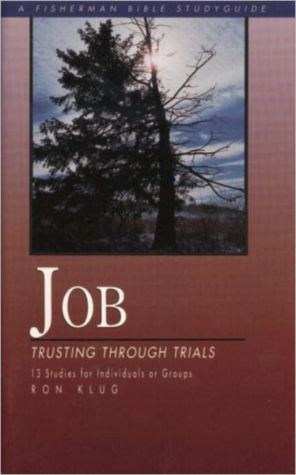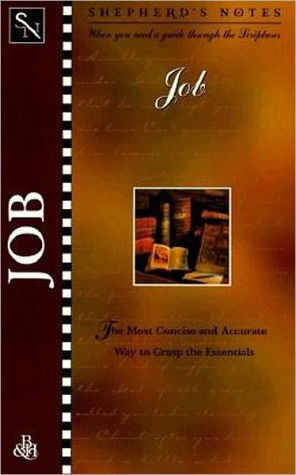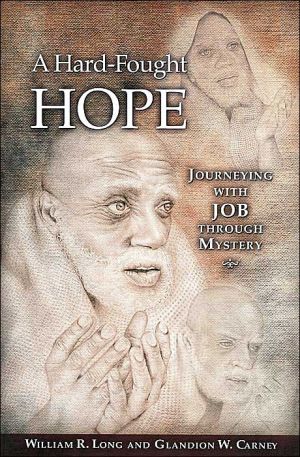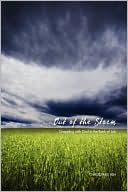Job: A Good Man Asks Why
The book of Job helps us work through one of the most difficult questions that confronts us in life: Why do bad things happen to good people? In Job: A Good Man Asks Why, author Kevin Perrotta walks us through the key points in the book of Job and helps us understand suffering, justice, and love in a new light.\ \ \ A Guided Discovery of the Bible The Bible invites us to explore God’s word and reflect on how we might respond to it. To do this, we need guidance and the right tools for...
Search in google:
Created for both individual and group use, each six-week discovery guide focuses on a specific book of the Bible. Weekly sections feature key passages along with related questions that encourage adults to explore the Bible for themselves and learn how it applies to their daily lives. These guides are designed for busy adults who wish to deepen their relationship with God and strengthen their understanding of Scripture. This guide focuses on the Book of Job.
How to Use This Guide\ \ You might compare this booklet to a short visit to a national park. The park is so large that you could spend months, even years, getting to know it. But a brief visit, if carefully planned, can be enjoyable and worthwhile. In a few hours you can drive through the park and pull over at a handful of sites. At each stop you can get out of the car, take a short trail through the woods, listen to the wind blowing in the trees, get a feel for the place.\ In this booklet we’ll drive through the book of Job, making half a dozen stops along the way. At those points we’ll proceed on foot, taking a leisurely walk through the selected passages. The readings have been chosen to lead us to the heart of the debate about the meaning of suffering that takes place in the book of Job. After each discussion we’ll get back in the car and take the highway to the next stop.\ This guide provides everything you need to explore Job in six discussions—or to do a six-part exploration on your own. The introduction on page 6 will prepare you to get the most out of your reading. The weekly sections feature key passages from Job, with explanations that highlight what his words mean for us today. Equally important, each section supplies questions that will launch you into fruitful discussion, helping you both to explore Job for yourself and to learn from one another. If you’re using the booklet by yourself, the questions will spur your personal reflection.\ Each discussion is meant to be a guided discovery.\ Guided. None of us is equipped to read the Bible without help. We read the Bible for ourselves but not by ourselves. Scripture was written to be understood and applied in and with the Church. So each week “A Guide to the Reading,” drawing on the work of both modern biblical scholars and Christian writers of the past, supplies background and explanations. The guide will help you grasp Job’s message. Think of it as a friendly park ranger who points out noteworthy details and explains what you’re looking at so you can appreciate things for yourself.\ Discovery. The purpose is for you to interact with the book of Job. “Questions for Careful Reading” is a tool to help you dig into the book and examine it carefully. “Questions for Application” will help you consider what it means for your life here and now. Each week concludes with an “Approach to Prayer” section that helps you respond to God’s Word. Supplementary “Living Tradition” and “Saints in the Making” sections offer the thoughts, experiences, and prayers of Christians past and present in order to show you what Job has meant to others—so that you can consider what it might mean for you.\ How long are the discussion sessions? We’ve assumed you will have about an hour and a half when you get together. If you have less time, you’ll find that most of the elements can be shortened somewhat.\ Is homework necessary? You will get the most out of the discussions if you read the weekly material in advance of each meeting. But if participants are not able to prepare, have someone read the “What’s Happened” and “Guide to the Reading” sections aloud to the group at the points where they occur in the weekly material.\ What about leadership? If you happen to have a world-class biblical scholar in your group, by all means ask him or her to lead the discussions. But in the absence of any professional Scripture scholars, or even accomplished biblical amateurs, you can still have a first-class Bible discussion. Choose two or three people to be facilitators, and have everyone read “Suggestions for Bible Discussion Groups” before beginning (page 76).\ Does everyone need a guide? a Bible? Everyone in the group will need their own copy of this booklet. It contains the sections of Job that are discussed, so a Bible is not absolutely necessary—but each participant will find it useful to have one. You should have at least one Bible on hand for your discussion. (See page 80 for recommendations.)\ How do we get started? Before you begin, take a look at the suggestions for Bible discussion groups (page 76) and individuals (page 79).\ \ A Book That Asks Hard Questions Introducing the Book of Job\ \ To start you thinking about the subject of the book of Job, I was going to begin this introduction with a story or two about people who are suffering. But is there any need? We are all well-acquainted with situations of pain and loss, including the kind that the book of Job portrays, in which the suffering seems undeserved, even terribly unfair. If the starting point for reading Job is an awareness of suffering, we all, sadly, have plenty of material to begin.\ Sooner or later, pain draws from us the agonizing question Why? Why has God let this dreadful thing happen to me or to another person? Why has God created a universe where such suffering can occur? How can God be just—indeed, how can God be—if such evil exists? What possible use can this suffering serve?\ To some people it may appear that such questions are inappropriate for a person of faith. The person who asks them may seem to lack trust in God. The questions may even seem dangerous, for often they are asked with anger, and it may seem unwise to get angry with God. And what if the questions have no good answers? In that case, it might be better not to pursue them, since they would only undermine our faith.\ The biblical, Christian tradition, however, does not counsel timidity or repression in our relationship with the Almighty. The writers of Scripture and the saints of the Church model honesty with God. Faith does not entail weak-minded avoidance of hard questions. Asking questions, even with deep feeling, is a necessary part of progress toward the truth. God is not afraid of our questions; in fact, he welcomes them. Concerning the why? that we cry out in suffering, Pope John Paul II has written: “Man can put this question to God with all the emotion of his heart and with his mind full of dismay and anxiety, and God expects the question and listens to it, as we see in the revelation of the Old Testament. In the book of Job the question has found its most vivid expression.”\ The Pope sounds almost like he is writing the introduction to this booklet. The book of Job is indeed the Bible’s most vivid and profound examination of the meaning of human suffering. Reading Job will lead us to reflect on our own questions about God and suffering—a process of reflection that can help us to mature in faith. Job will also spur us to reflect on less theoretical questions— how suffering should be borne, how comfort to the suffering should (and should not) be given, how comfort should be received.\ The central question. Probably all people who have suffered, whatever their beliefs about God or gods, have asked why. The Jewish and Christian view of God gives the question a special urgency. The God who made himself known to Israel and revealed himself perfectly in Jesus of Nazareth is the creator and ruler of all. He is a just and loving God who takes a deep interest in human beings and promises to lead us into happiness with himself. The evils that arise in the world force us to ask how this God, who is so powerful and so compassionate, can allow so much to happen that seems to contradict his purposes.\ For some people, this question takes the form of what has been called “the problem of pain.” The question is whether the existence of a powerful and loving God who is deeply involved in human lives can be squared with the existence of extreme suffering. Some people reason that an all-powerful and perfectly loving God would not allow great evils to occur; since there are great evils in the world, either God does not exist or, contrary to Jewish and Christian belief, he is not all-powerful or all-loving or deeply involved in our lives.\ This “problem of pain” reflects a modern way of thinking. In ancient cultures, it was impossible to imagine the kind of atheism that the problem of pain leads some people to embrace today. To the ancient Israelites in the centuries before Christ, the question about God and suffering was this: Given that God is powerful and just, can we interpret suffering as an expression of God’s administration of justice? That is to say, is all suffering God’s punishment, or at least his discipline, for sin?\ In ancient Israel, many people would answer yes to this question. The author of Job, however, disagreed, and he undertook to write a story that would demonstrate the inadequacy of that answer and explore whether there is an alternative explanation. For the sake of argument, the author supposed that there was once a thoroughly upright person, a person who, at least in every important way, did exactly what God wanted—a person who did not need punishment or correction. What if this person were afflicted by great evils? To develop his idea, the author, it seems, adapted a legend about a figure named Job (he is mentioned elsewhere in the Bible, in a way that assumes that readers are familiar with the legend—Ezekiel 14:14, 20). Job is a good man who suffers grievous losses and is struck with a loathsome disease.\ The author expands the legend into a lengthy consideration of the meaning of suffering. For the bulk of the book, Job and some of his friends engage in a debate. The friends defend the traditional view that suffering is God’s punishment or discipline for sin. Job, who used to accept this view, now angrily rejects it, because it no longer fits his experience. Job expresses rage and confusion, a desire for justice and a longing for death, trust in God and disappointment with God. The friends, applying the traditional explanation of suffering to Job’s situation, conclude that he has committed some grave sin. Insisting that he has not sinned, at least not in any serious way, Job seeks a confrontation with God—a kind of day in court in which he can vindicate his innocence. By implication, Job’s vindication would mean that God has dealt unfairly with him. Finally God appears and speaks. God rebukes Job—but then rebukes Job’s friends even more severely!\ This nutshell summary of the book hardly does it justice. The conversation between Job and the friends, for example, is not a straightforward debate. To a great extent the friends and Job talk past each other; the friends do not come to grips with Job’s situation, and he must struggle with the apparent injustice of his suffering alone. Job’s isolation is, in fact, accentuated by the presence of friends who do not really understand him. With moving poetry Job bemoans the fragility and brevity of human life (chapter 14) and recalls with sorrow his happier days (chapter 29). He berates his unsympathetic friends (6:14–21; 12:1–6; 13:1–5; 16:1–6). He declares the inaccessibility of true wisdom (chapter 28). He shrieks with protest against God’s blows (chapters 7, 10), yet paradoxically he trusts in God’s goodness; with seeming illogic, he even relies on God to defend him against God who is unjustly afflicting him (16:11–22; 19:8–22, 25–27). Such passages give this book a complexity, depth, and beauty that place it on a par with other literary masterpieces probing the existence of evil in the world, such as St. Augustine’s City of God, Shakespeare’s King Lear, and Milton’s Paradise Lost. Even if the book of Job were not God’s inspired word, it would deserve our attention as a profound examination of the human condition.\ In this booklet we will not try to investigate the book of Job in all its complexity. We will simply follow the main thread of the argument, leaving much else aside. This approach is actually a good way to read Job for the first time. Once you are familiar with the main road, you are better able to explore the side roads without getting lost. If you would like to go beyond the sections of Job that we read here, you might look at the sections mentioned in parentheses in the preceding paragraph. Then go back to the beginning and read the whole book all the way through, preferably with the help of a study Bible or commentary (see page 80).\ Where Job leaves us. The book of Job completes a stage in the human journey toward an understanding of suffering. Job clears away a false interpretation—often a necessary step in attaining the truth—and opens the way to a better explanation. But the book of Job does not offer a better explanation. The book leaves us with a humble awareness of the limitations on our ability to grasp the mystery of suffering. If we are to understand more, we will need God to shed more light on the subject. An article at the end of this booklet explores how God has done this through his Son’s becoming a human being and sharing our suffering. Along the way, the “Saints in the Making” and “Living Tradition” pieces feature thoughts and prayers on suffering from the perspective of faith in Christ.\ \ Week 1\ Crushed in the Prime of Life\ \ Questions to Begin\ 15 minutes Use a question or two to get warmed up for the reading.\ \ 1 When you were a teenager and went out at night, your parents would enjoy having a little peace and quiet.\ assume you were getting into trouble.\ forget you were out.\ pray the rosary.\ wait up for you.\ wait up awhile, then go to bed.\ start calling your friends’ parents if you didn’t come in on time.\ grill you afterwards about where you were, who you were with, what you were doing.\ 2 What do you think “fear of the Lord” means? Do you “fear the Lord”? Why or why not?\ \ Opening the Bible\ 5 minutes Read the passage aloud. Let individuals take turns reading sections.\ \ The Reading: Job 1:1–2:10\ God Tests Job\ 1 There was once a man in the land of Uz whose name was Job. That man was blameless and upright, one who feared God and turned away from evil. 2 There were born to him seven sons and three daughters. 3 He had seven thousand sheep, three thousand camels, five hundred yoke of oxen, five hundred donkeys, and very many servants; so that this man was the greatest of all the people of the east. 4 His sons used to go and hold feasts in one another’s houses in turn; and they would send and invite their three sisters to eat and drink with them. 5 And when the feast days had run their course, Job would send and sanctify them, and he would rise early in the morning and offer burnt offerings according to the number of them all; for Job said, “It may be that my children have sinned, and cursed God in their hearts.” This is what Job always did.\ 6 One day the heavenly beings came to present themselves before the Lord, and Satan* also came among them. 7 The Lord said to Satan, “Where have you come from?” Satan answered the Lord, “From going to and fro on the earth, and from walking up and down on it.” 8 The Lord said to Satan, “Have you considered my servant Job? There is no one like him on the earth, a blameless and upright man who fears God and turns away from evil.” 9 Then Satan answered the Lord, “Does Job fear God for nothing? 10 Have you not put a fence around him and his house and all that he has, on every side? You have blessed the work of his hands, and his possessions have increased in the land. 11 But stretch out your hand now, and touch all that he has, and he will curse you to your face.” 12 The Lord said to Satan, “Very well, all that he has is in your power; only do not stretch out your hand against him!” So Satan went out from the presence of the Lord.\ 13 One day when his sons and daughters were eating and drinking wine in the eldest brother’s house, 14 a messenger came to Job and said, “The oxen were plowing and the donkeys were feeding beside them, 15 and the Sabeans fell on them and carried them off,and killed the servants with the edge of the sword; I alone have escaped to tell you.” 16 While he was still speaking, another came and said, “The fire of God fell from heaven and burned up the sheep and the servants, and consumed them; I alone have escaped to tell you.” 17 While he was still speaking, another came and said, “The Chaldeans formed three columns, made a raid on the camels and carried them off, and killed the servants with the edge of the sword; I alone have escaped to tell you.” 18 While he was still speaking, another came and said, “Your sons and daughters were eating and drinking wine in their eldest brother’s house, 19 and suddenly a great wind came across the desert, struck the four corners of the house, and it fell on the young people, and they are dead; I alone have escaped to tell you.”\ 20 Then Job arose, tore his robe, shaved his head, and fell on the ground and worshiped. 21 He said, “Naked I came from my mother’s womb, and naked shall I return there; the Lord gave, and the Lord has taken away; blessed be the name of the Lord.”\ 22 In all this Job did not sin or charge God with wrongdoing.\ The Test Gets Harder\ 2:1 One day the heavenly beings came to present themselves before the Lord, and Satan also came among them to present himself before the Lord. . . . 3 The Lord said to Satan, “Have you considered my servant Job? There is no one like him on the earth, a blameless and upright man who fears God and turns away from evil. He still persists in his integrity, although you incited me against him, to destroy him for no reason.” 4 Then Satan answered the Lord, “Skin for skin! All that people have they will give to save their lives. 5 But stretch out your hand now and touch his bone and his flesh, and he will curse you to your face.” 6 The Lord said to Satan, “Very well, he is in your power; only spare his life.”\ 7 So Satan went out from the presence of the Lord, and inflicted loathsome sores on Job from the sole of his foot to the crown of his head. 8 Job took a potsherd with which to scrape himself, and sat among the ashes.\ 9 Then his wife said to him, “Do you still persist in your integrity? Curse God, and die.” 10 But he said to her, “You speak as any foolish woman would speak. Shall we receive the good at the hand of God, and not receive the bad?” In all this Job did not sin with his lips.\ Questions for Careful Reading\ 10 minutes Choose questions according to your interest and time.\ 1 Locate the verses in which Job speaks. What impression of him do you get simply from his own words?\ 2 Why does God allow Satan to afflict Job?\ 3 Job’s children perish while they are feasting—the very situation in which Job tried to protect them by his prayers. What message might there be in this?\ 4 What is a potsherd? Why would a person want to scrape tender sores?\ 5 What would the disasters that befell Job have meant for his wife?\ \ A Guide to the Reading\ If participants have not read this section already, read it aloud. Otherwise go on to “Questions for Application.”\ \ The Hebrew text begins vaguely: “A man there was” (1:1), like the opening of a parable (“A man had two sons”). The author says nothing about the man’s background, only that he lives in “the land of Uz” (1:1), a perhaps legendary place, somewhere in the East. A man of indistinct origins, Job is an everyman, a person with whom anyone could identify.\ Job possesses oxen for farming, sheep for pasturing, camels for trading, and servants for running a large household (1:3). In those days men and women married in their teens, but Job’s daughters, at least, appear to be unmarried, so they must be quite young, and Job himself not old. He is a wealthy, busy, middle-aged man with a lot to live for.\ Most important, Job is good. The author makes this point four times over (1:1); God himself declares it proudly (1:8). Job’s goodness, it is later seen, lies in his justice, compassion, and generosity (29:11–17; 31:1–40). He does more than God requires, offering sacrifices even for sins that may not have been committed (1:5). Job’s goodness is a polestar that we must keep in view as we navigate through the story ahead.\ Ancient readers would not have been surprised that upright Job was also affluent. They regarded morality and prosperity as a package: live right and God will bless you. Job accepted this traditional view, and so did the original readers. It is a view, perhaps unexamined, held by many of us today. The book of Job will help us examine it.\ The next character to appear, God, is pictured as an ancient Near Eastern king sitting on a throne with attendants and government ministers standing around him (1:6). Among his servants is “Satan” (1:6). Significantly, in the Hebrew he is called “the Satan.” “Satan” is not his personal name but his office. He is “the accuser, the opponent,” a royal agent who investigates and prosecutes antigovernment activities. Jewish and Christian tradition later adopted “Satan” as the personal name of the prince of devils (see Revelation 12:9–10). In Job, however, “the Satan” is a functionary in the heavenly court. Job is a story, not a theological treatise; consequently the heavenly court and the Satan are imaginative devices for creating a narrative, rather than literal features of heaven.\ As God-the-king’s servant, even if a somewhat unpleasant one, the Satan has the royal interests in mind. It is his duty to point out possible disloyalty. He is a kind of “devil’s advocate.” The Satan does not deny that Job is pious, but he alleges that his piety is less than wholehearted (1:9–11). Granted that Job is an upright person; but why does he do right? Is it because he loves God—or because he loves the good things that God gives him? The Satan claims that Job’s devotion to God is not as deep as it appears. If God were to remove his blessings, Job would “charge God with wrongdoing” (1:22), that is, he would accuse God of being unjust.\ God decides to test Job, as he once tested Abraham (see Genesis 22), to get at the truth about him. The only way to find out if Job serves God only because of the good things that God gives him is to take the good things away. So God commissions the Satan to do that. The Satan inflicts the disasters, but only as God’s agent; God is responsible for what befalls Job (2:3). This immediately suggests that the traditional doctrine—God always rewards good behavior in this world—does not provide a comprehensive explanation for all of God’s dealings with people.\ Disasters come in rapid succession, leaving Job no time to react until the whole series of calamities has been announced (1:13–19). Then he bows to the ground—an expression of both worship and prostration under the load of woes (1:20). His first words are to bless God (1:21). To “bless” God is to declare that God is the source of good things. Job continues to acknowledge God as giver, even when his gifts are withdrawn. Job has passed the test.\ In a second conference, God acknowledges that he has afflicted Job “for no reason” (2:3), that is, even though Job did not deserve it. He then mandates a second round of testing (2:6).\ Job’s wife advises him to accuse God of wrongdoing and bring down divine wrath on himself: suicide by blasphemy (2:9). Job, however, steadfastly says only what is right about God (2:10). But will he continue to do so?\ \ Questions for Application\ 40 minutes Choose questions according to your interest and time.\ \ 1 God considers the Satan’s question important—so important that it warrants subjecting Job to testing in order to determine the answer. Why is the question important?\ 2 What are your motivations for obeying God? In what ways are your motivations mixed? What are good and not-so-good reasons for obeying God? What effect do a person’s motivations have on their relationship with God?\ 3 Job tries to preserve his children’s relationship with God and protect them from harm. How attainable are these goals by parents? What can parents do for their children spiritually? What can’t parents do? What should they not try to do? To what degree do the answers depend on children’s ages?\ 4 In what ways do spouses affect each other’s attitudes and behavior? How do spouses sometimes discourage each other? How can spouses encourage each other?\ 5 When has suffering or loss broken in on you unexpectedly during a time of happiness and peace? How did you react? What did you learn from this experience? How has it affected your relationship with God?\ \ “Try to curb any natural tendency to either excessive talking or excessive quiet. You and the rest of the group will benefit.”\ Christian Basics Bible Studies series, InterVarsity Press\ \ Approach to Prayer\ 15 minutes Use this approach—or create your own!\ \ Reflect on the difference between loving God and loving the things that God gives. Let one person read aloud this prayer from St. Augustine’s Confessions. After a few minutes of silence, pray an Our Father aloud together.\ Late, late have I loved you, Beauty so old and so new! Here you were within me, and I was outside, searching for you there, blundering disgracefully among the lovely things you have made. You were with me, but I was not with you. Things that would not have existed apart from you kept me apart from you. You called and shouted and broke through my deafness. You flashed and shone and pierced my blindness. You blazed with ardor, and I breathed in your fragrance, and now I pant for you. You touched me, and I burn with longing for your peace.\ \ A Living Tradition A Perceptive Reader\ This section is a supplement for individual reading.\ \ Thomas Aquinas, a great theologian who lived in the thirteenth century, was a perceptive reader of the Bible. Here are a few remarks that St. Thomas made on Job.\ On the sequence of Job’s woes (1:13–19; 2:7). First the loss of his property is reported, second the crushing of his offspring, third his own personal torment. This progression is for the purpose of increasing his suffering, for a person who has been crushed by a greater misfortune does not feel a lesser one; but after a lesser misfortune, the person feels a greater one. Therefore, so that Job might feel the particular suffering of each misfortune, Satan began to afflict him with a lesser misfortune and proceeded little by little to the greater.\ On the timing of his children’s death (1:13, 18). It is likely that a dinner party in the house of the first-born son would be particularly festive. It is worth considering that people are more shaken by things that happen to them suddenly, for misfortunes foreseen are more easily endured. In order, then, that Job might be shaken, Satan brought misfortune on him at a very pleasant time, when he was less able to think about misfortune. Thus the very presence of enjoyment would make the misfortune seem heavier.\ On the meaning of Satan’s obscure statement: “Skin for skin! All that people have they will give to save their lives” (2:4). “Skin for skin,” that is, “someone else’s flesh for his own.” For a man who is not virtuous will bear up when others, even those who are close to him, suffer rather than himself. Any man will give everything external in order to save his life.\ Thomas, it seems, thinks that Job refrained from expressing anger toward God when his children died because he feared that God would punish such an outburst by inflicting physical suffering on him. Thus, Satan alleges, Job saved his own skin by maintaining a prudent silence when his children lost their lives. Thomas writes, “Satan means that Job endured the loss of his possessions and his children patiently for the safety of his own body. Satan points out that this was not very virtuous behavior, since it was only human.”
Contents\ 4 How to Use This Guide\ 6 A Book That Asks Hard Questions\ 10 Week 1\ Crushed in the Prime of Life\ Job 1:1–2:10\ 20 Week 2\ A Cry of Pain\ Job 2:11–3:26\ 30 Week 3\ What Kind of Help Is This?\ Job 4; 5\ 40 Week 4\ Job’s Lawsuit against God\ Job 9; 13; 23; 30\ 50 Week 5\ God Ends the Debate\ Job 38; 39; 40\ 60 Week 6\ Now I Have Seen You\ Job 40; 42\ 70 Jesus and the Meaning of Suffering\ 76 Suggestions for Bible Discussion Groups\ 79 Suggestions for Individuals\ 80 Resources\ 81 Six Weeks with the Bible on Your KINDLE







